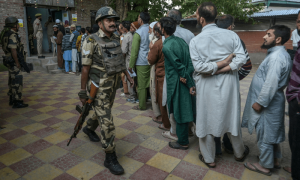KARACHI, Aug 13: Chief Minister Sindh Syed Qaim Ali Shah, presiding over a meeting on Monday to review efforts made to control an outbreak of the Newcastle Disease Virus (NDV), commonly known as ‘Rani Khet’, among peafowl in Tharparkar district, ordered prompt efforts to protect peacocks from natural and manmade dangers.
At the meeting, attended by Sindh wildlife minister Dr Daya Ram, livestock minister Mir Abid Jatoi, agriculture minister Syed Ali Nawaz Shah Rizvi, the secretaries for livestock, agriculture and wildlife, the chief minister said peafowl was a beautiful bird of Sindh.
He also directed the livestock department to extend technical and professional expertise and support to the wildlife department to prevent an outbreak of the disease among the fowl in the Thar desert and the adjoining areas.
Wildlife secretary Mushtaque Ali Memon said there were about 70,000 peafowl in Tharparkar, Mithi, Nagarparker, Diplo and Chhachhro scattered over 33,000 hectares. The first unnatural death of a peafowl was reported on July 18. In 2011, 19 mortalities were reported. He said 44 peafowl had died and 34 reported sick. He said due to prompt efforts made by the wildlife department the situation was under control as vaccination of healthy population of peafowl had been undertaken.
He said 10 teams comprising 45 personnel of the Sindh wildlife, poultry and forest departments were working in field and no mortality was reported after Aug 8. Heavy showers in the affected areas on Aug 7 and 8 also improved the situation.
The secretary said the wildlife department had sensitised the field force to ascertain the cause of the unnatural death; five field teams comprising wildlife and veterinary personnel had carried out treatment operations, provision of first aid to diseased birds, burying dead peafowl in two-foot-deep pits, had created awareness in the public to deal with the disease. A prolong drought, delayed monsoon, scorching heat, desiccation, starvation (deficiency of food, water in the area) and bacterial source were the main causes of disease attacks on birds.
He said domesticated poultry attacked weak, suppressed peafowl, causing their deaths. He said specimen of dead and ailing birds were brought to laboratory for chemical examination to ascertain the cause. Tests and laboratory examinations confirmed it was caused by the NDV.
He said watering points were being treated with lime to eradicate fungal contamination, infected specimens isolated, special quarantine facility developed to treat affected birds, and healthy population vaccinated to control spread of the disease. So far 45,000 doses of vaccine had been distributed among local persons.
The WWF and IUCN were sensitised to carry out a scientific survey to ascertain the actual deaths.
Mr Memon referred to a WWF-Pakistan report according to which many of the populations reported by the media as infected were not at all infected and the deaths seemed to be restricted to a few villages only.
He said a long-term recovery and action plan was developed with the collaboration of the IUCN and WWF to address any future outbreaks. The scope of the existing ADP schemes conservation and propagation of rich biodiversity in Tharparkar was being revised to arrange for peafowl recovery and breeding progress.
Director for the Sindh poultry vaccine Dr Nazeer Hussain Kalhoro said that due to timely vaccination, the NDV had not turned into an epidemic.—PPI













































Dear visitor, the comments section is undergoing an overhaul and will return soon.